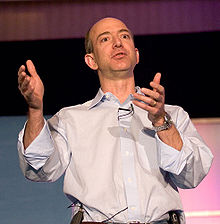
We live in an interesting time. In less than 20 years, Amazon’s grown from a no-profit bookstore into a giant that sells everything. And yet, is the company really earning a profit? I always enjoyed the analysis at The Motley Fool, which make questions like these sound like a fun bar-stool conversation. And this month they published a brand new article about Amazon’s Kindle tablets — revealing that when it comes to selling ebooks, movies, and TVs, Amazon has finally found a sweet spot.
“A year or two ago, it was hard to find much evidence that Amazon’s Kindle strategy was working as expected,” writes Adam Levine-Weinberg (a senior analyst for the Fool web site). Back when Amazon first launched their Kindle Fire tablets, it didn’t result in a massive increase in their sales of movies and ebooks. “Amazon’s North American media sales rose just 15% in 2012,” writes the analyst, “slightly below the 2011 rate and well below the growth rate of most of Amazon’s other segments.” And in fact, through June of last year, the growth in Amazon’s media sales actually seemed to be decreasing from what it had been in the previous year.
But by December, the year-to-year comparisons were telling a happier story. Over the previous 12 months, Amazon’s sales of e-books, movies, and TV shows grew by a whopping 21%. There’s an interesting caveat. Apparently Amazon actually earns three times as much money on “electronics and general merchandise” as it does on ebooks and media sales. But as things start to cool off on the gadget-selling business, investors will be delighted to see that Amazon’s actually selling more media to view on those gadgets…
Of course, the Fool hasn’t always been bullish about everything Amazon does — and it’s really fun to look back at what they’ve written about the company over the years. Back in 2010, they complained about the metaphors Amazon used to avoid giving specific numbers about how many Kindles they’d actually sold. One article complained it’s “like having a discussion with a kindergartner or a politician. They all tell you what they think you want to hear…but lack the details you really need to know before drawing your own conclusion!”
So it was a big deal in December of that year when Amazon finally did reveal a number — sort of. “Amazon still isn’t coming clean with how many Kindle e-book readers it’s selling,” the site reported, “but at least now we know that it will be in the ‘millions’ this holiday quarter alone.” They headlined their article “It’s Raining Kindles!” and soon there was even more big Amazon news. Last year a business analyst at The Motley Fool pointed out that people who join Amazon’s Prime program ultimately use Amazon for the majority of their online shopping, and end up spending more than twice the amount spent by non-Prime members!” (The average Prime member spends $1,200 a year on Amazon’s web site….) And with their latest increase in the sales of digital media, The Motley Fool reached the only conclusion possible.
“Amazon’s quest for long-term dominance in the market for books, music, and movies is back on track!”
